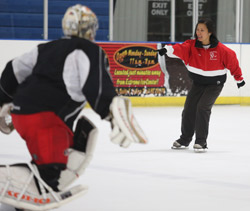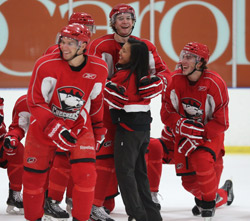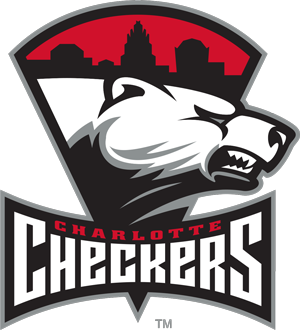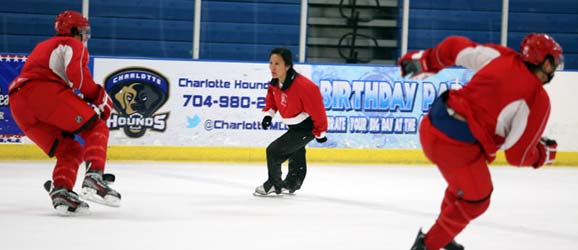Instead of the more conventional team practice led by coach Jeff Daniels that one might have expected on Tuesday, the team underwent its monthly power skating session led by coach Kim Muir. The first exercise during training camp didn’t seem terribly out of place, but none of the players asked could remember taking time off between games to focus on skating, something they’ve now done on two separate occasions.
“I’ve been power skating for 10 years, but never in season,” said forward Zac Dalpe.
Even Muir admits she doesn’t see much of the other teams on her client list, which includes the NHL’s Detroit Red Wings and the Ontario Hockey League’s Plymouth Whalers, during the season due to schedule constraints. However, the weekend-heavy AHL schedule usually lends itself to long breaks between games, such as the six-day hiatus the Checkers are in right now.
Though having a first-place team might have something to do with it, even Daniels said he doesn’t mind turning over control of his team every now and then.

“It’s nice to have a different voice preaching something different than what you’re used to,” said forward Chris Terry.
According to Daniels, the outside-the-box approach was developed by Ron Francis, the Hurricanes’ vice president of hockey operations who takes an active role in overseeing the development of players in Charlotte.
“We’re trying to give guys every tool they need to get to the next level,” said Daniels. “Skating is a big part of the game, and we want to help guys use it to their advantage.”
The advantage being?
“We work on all aspects of skating,” said Muir, formerly a competitive figure skater who now teaches power skating full time. “Some of it is technical and some of it is creative footwork. If someone has bad habits you have to break them down and start from scratch, but it’s mostly about muscle memory and having that success build your confidence.”
The sessions, typically an hour in length, incorporate a variety of drills ranging from the expected (maximizing the efficiency of each stride to get shots off as quickly as possible) to the unexpected (group exercises that more closely resemble Tai Chi on ice; skating the length of the ice while hopping from one skate to another).
The goal isn’t to change the way players skate immediately, but rather to make them more aware of their strides and eventually develop better technique over time.

“You work on different thing like lengthening your stride – stuff you might not think to do naturally because normally you’re just trying to move as fast as you can without that technique,” said Terry.
Against all odds, even the goalies, still in their full gear, seem to enjoy the change of pace.
“It’s not very often that goalies get a whole session to work on skating with the puck,” said Justin Peters. “You look at something like this and think, ‘What are the goalies going to do?’ but it’s really good to get those reps in.”
Still, they may not win many footraces.
“The old trademark is that your goalie needs to be your best skater, but I don’t know if that’s true or not," said Peters.
Besides getting away from the monotony of practices in weeks like this one, the majority of players also seem to enjoy the sessions due to Muir’s upbeat coaching style, which always includes a round of hugs at the end.
“You have to make it fun, because they’re not going to respect you or what you’re doing if you’re militant,” said Muir, whose staff of instructors includes former Carolina Hurricanes draft pick Damian Surma. “If they’ve done some power skating before they might think they’re going to do laps or crossovers the whole time, but there are so many other aspects with your balance and footwork that you can work on.”
Muir, normally based in the Detroit area, is scheduled to return to Charlotte to work with the Checkers roughly once a month for the remainder of the season. Based on feedback from players, not to mention on-ice results, her visits will continue to be welcomed.
“Hockey players are superstitious, so if it’s working, guys like it,” said Dalpe.






